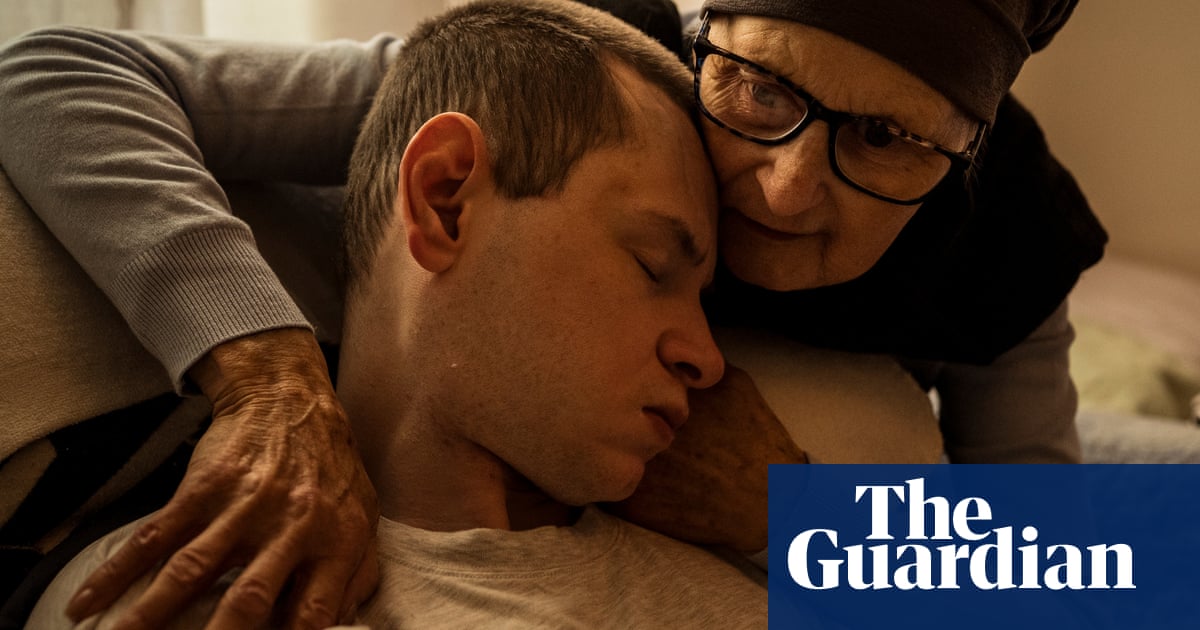Next to the bed Steven Rieger spends most his life in is a framed print that says: “This is my happy place.” For him, it is – his small room on the eastern outskirts of Melbourne is covered in Collingwood paraphernalia and basked in warm light.
Steven, 37, needs round-the-clock care. He lives with cerebral palsy, is nonverbal and suffers from seizures – natural light can trigger them so he spends almost all of his time in his room.
His parents are both in their 70s – his father Rodger has had several strokes and is partly deaf. His mother, Kathy, who has cared for him most of his life, is dying – her breast cancer has metastasised, spreading to her bones and brain.
In March, the family lost their national disability insurance scheme (NDIS) funding, and Steven’s paid carers felt obliged to work for free – the family could not cope by themselves.
They had been overspending on their plan, but the family say they were underfunded for their care needs. When the money ran out they panicked. Steven’s sister Kylie started a GoFundMe and Kathy rang their local member of parliament, Julian Hill. They have now been put on a plan that provides 10 hours of care a day, but they need more.
“It was almost three weeks where there was no funding,” Kathy says. “The carers that do look after Steven were nice enough to still come in here, but they weren’t getting paid. They were doing their normal shifts but without pay.”
Sign up for Guardian Australia’s breaking news email
Advocates say participants have become collateral damage as the NDIS goes through massive changes, with many plans expiring and reviews dragging on. They say crucial funding is not getting where it needs to go.
In January, Kathy had started preparing everything for the annual review of Steven’s plan. As she was getting sicker she knew they needed to be funded for 15 hours of care a day.
“It was very stressful for me,” she says. “I was getting things organised … and hoping the funding wouldn’t run out, but it did.
“We started calling NDIS a few weeks before this funding was going to run out, and they said it wouldn’t run out. They said they would escalate [the case] every time.”
The family say they now owe around $15,000 to carers for the three weeks of work. Twice a day, Steven is lifted into a chair and fed through a drip.
El Gibbs, CEO of theDisabilityAdvocates Network Australia, says the NDIS is delaying plan renewals for so long, people run out of personal funds.
“We had a meeting a few weeks ago, and all our members reported a 50% or more increase in their waiting list for help with AAT [administrative appeals tribunal] appeals, where people with disability and their families are fighting for the support that they need,” Gibbs says.
Under the changes, NDIS plans are meant to automatically continue if the review has not taken place yet. Because the Riegers were asking to increase Steven’s care hours, their plan ran out.
The last quarterly reports show an increase in participants taking their review decision to the AAT, with the number of new cases as a proportion of active participants increasing from 0.66% in the March 2023 quarter to 1.05% in the March 2025 quarter.
Gibbs says the delays mean people in crisis are falling through the cracks, as is the case for the Riegers – Steven’s funding running out while Kathy is dying worsens the family’s situation.
Sign up toBreaking News Australia
Get the most important news as it breaks
after newsletter promotion
“Our disability support system has to be able to meet them where they are,” Gibbs says.
“If a family goes through a crisis, and informal supports aren’t there any more then, of course, the NDIS needs to step in and do it quickly and make sure a terrible situation isn’t made harder.”
Gibbs says vulnerable families should not be accruing debt to get the right care and the massive reforms to the NDIS need to be more clearly communicated.
“At the moment, the changes are often rushed and harsh, and the communication about them isn’t clear to people with disability, to families, to support coordinators,” she says.
“So it is really hard for everyone to understand what is happening and to have a clear pathway about what comes next.”
A spokesperson for the National Disability Insurance Agency said its priority was “ensuring every participant, like Steven, has access to the disability-related supports they require”.
“The agency continues to work with Steven and his parents regarding his future needs.
“When a participant’s circumstances change a request for an early plan reassessment can be requested. The agency cannot make decisions to change a participant’s plan without being provided appropriate evidence.”
Jenny McAllister, the minister for the NDIS, was contacted for comment.
An occupational therapist report to possibly increase Steven’s care to 15 hours a day is set for three weeks’ time, but Kathy is struggling.
“I physically can’t care for Steven any more,” she says.
“With extremely high needs like Steven’s, there shouldn’t be a review in their plan. They’re not going to get better. There’s no change.
“They’re not going to wake up one day and go, ‘Oh, hi Mum, I’m all good. I’m going to work now.’”
